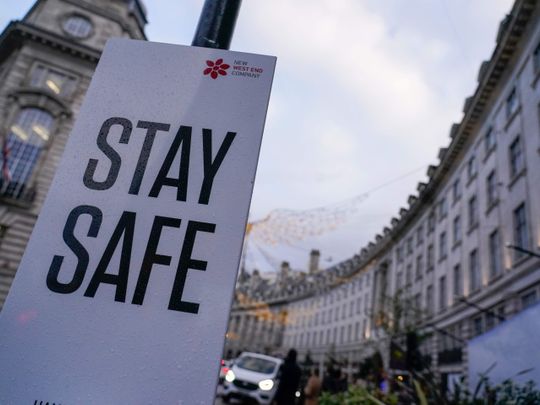
London: The UK joined Belgium, Hong Kong and Israel in detecting cases of the new omicron COVID-19 variant, in two people with a connection to recent travel in southern Africa.
Saturday’s announcement came as officials across Europe are on alert for confirmation that the new variant has arrived, days after it was first identified and before rapidly imposed travel bans kicked in.
The two cases “are linked, and there is a link with travel to southern Africa,” said UK Health Minister Sajid Javid.
The two individuals in the UK — in Nottingham and Chelmsford, cities about 120 miles (193 km) apart — are self-isolating and contact tracing is ongoing. The UK expanded to 10 the African countries from which flights will be restricted.
Earlier, health officials in the Netherlands said 61 people — or about one in 10 — tested positive for COVID-19 after flights from Johannesburg and Cape Town to Amsterdam’s Schiphol Airport on Friday.
Dutch authorities will research whether the cases are from the new strain.
The travellers with positive readings must enter hotel quarantine in the Netherlands for as long as a week. Those who tested negative were free to return home, or to catch connecting flights.
Belgium’s health minister on Friday confirmed one case of the new variant in an unvaccinated person who’d returned from abroad. In the Czech Republic, a traveler on a flight from Namibia is suspected to have arrived infected with the new variant, CTK news service reported.
It’s “very likely” the new strain was brought in by a person arriving in Frankfurt from South Africa on Friday night, Kai Klose, minister of social affairs in the German state of Hesse, said Saturday on Twitter.
Complete sequencing of the virus sample from the traveler is still pending, Klose said.
The emergence of the omicron variant comes as much of Europe is already engulfed in a fourth wave of coronavirus cases — one that’s been driven by the highly infectious Delta strain.
Hospitals are stretched to capacity in some areas, countries like Austria are back in lockdown or have imposed curfews, and vaccine campaigns have in many instances fallen short of levels thought to create herd immunity.
Germany is “developing a new, precise way of dealing with the current challenges” of coronavirus and the omicron strain, incoming Chancellor Olaf Scholz tweeted on Saturday, vowing to “do whatever it takes.”
The World Health Organization on Friday declared the omicron strain a “variant of concern.” Scientists say the variant carries a high number of mutations in its spike protein, which plays a key role in the virus’s entry into cells in the body. Labs in Europe, the US and Africa are preparing for tests to see how the new variant is likely to behave in people who’ve been vaccinated or previously infected.
The discovery of the omicron strain has drastically shifted South Africa’s Covid profile after its third coronavirus wave, which peaked in July, dwindled to only a few hundred cases a day earlier this month. By Friday, 2,828 cases were reported and the positive tests rose to 9.2% from 6.5%.
Wastewater analysis shows that COVID-19 infections are surging in two major metropolitan areas, the South African Medical Research Council said.
Many travellers rushed to catch remaining flights to Europe and beyond before travel bans on several southern African countries were imposed on Friday.
Among those were more than a dozen professional golfers, mostly British and Irish, who’d been playing a tournament in Johannesburg. Two visiting Welsh rugby teams also scrambled for flights.
Worries that the new strain could be particularly transmissible were stirred by news from Hong Kong that a person in quarantine may have been infected by a traveler from South Africa across a hotel corridor.








